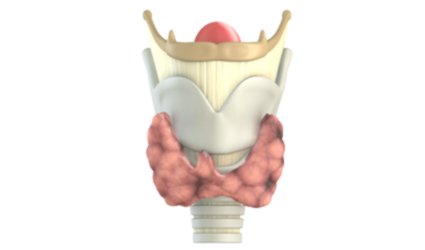
Approximately 1,700 new cases of thyroid cancer are diagnosed in Spain every year , which represents 1% of total tumors. Between 5 and 10% of the nodules that appear in the thyroid gland have a diagnosis of cancer, while the remaining 90-95% are benign. The most common are papillary carcinomas (80-85% of the diagnoses of thyroid cancer) and follicular (5-10%), to which we must add anaplastic medulary carcinomas, as well as thyroid lymphoma.
Causes of thyroid cancer
The causes of thyroid cancer are very diverse:
- A diet low in iodine.
- Family history of goiter (enlargement of the thyroid gland).
- Radiation directed to head and neck during childhood.
- Sex: it is more frequent in women than in men (in a ratio of 2 to 1).
- Age. Be over 70 or under 20.
- Genetic heritage.
Symptoms of thyroid cancer
This type of tumor does not usually cause symptoms until it is very advanced. In addition, these symptoms may be due to other pathologies, so it will be necessary to make a differential diagnosis:
- Appearance of a bulge in the neck.
- Trouble breathing and swallowing.
- Hoarseness.
Thyroid Cancer Treatment
Thyroid cancer treatment depends on the type and degree of development, applying one or more of the following options:
- Surgery: removal of part or all of the thyroid gland and lymph nodes in the neck that are affected.
- Radiation therapy: in follicular and papillary tumors, radiotherapy is performed with radioactive iodine, which is administered orally and requires total isolation of the patient for a few days.
- Chemotherapy: In addition to the approved cytostatics for the treatment of this type of cancer, there is currently a specific drug (tyrosine kinase inhibitor) that works by slowing tumor growth.
- Thyroid hormone therapy: it has a double aspect. On the one hand replace the lost function of the thyroid gland, administering thyroid hormone. On the other hand, treatment with medications that prevent the body from developing thyroid-stimulating hormone or thyrotropin (TSH) is essentially used to prevent thyroid cancer from reactivating.

Familial thyroid cancer
A small proportion of thyroid cancers – medullary familial thyroid carcinoma and familial papillary carcinoma – are hereditary and are defined by the transmission of parents to children of a specific genetic alteration (RET and MET, respectively). Being a carrier of the RET gene determines that almost certainly (98-100%) a medullary family thyroid carcinoma will develop, a type of tumor that easily metastasizes and, in fact, is usually diagnosed late, when metastases have already appeared. On the other hand, if the mutation that is a carrier is the MET, then there is a risk of suffering a familial papillary carcinoma.
When a patient with thyroid cancer is a carrier of one of these two genetic mutations, all family members should be studied to identify those who are at risk of developing it and undergo very close monitoring to adopt the necessary preventive measures that prevent that develop the tumor If the mutation is very high risk, the thyroid gland (thyroidectomy) must be removed before the age of five.
When the mutations identified are of high or moderate risk, it must be carried out before the age of ten, and before the age of twenty if they are of moderate-low risk. This surgical intervention generates hypothyroidism in the patient, so, although he can lead a perfectly normal life, he must undergo replacement therapy for the rest of his life.